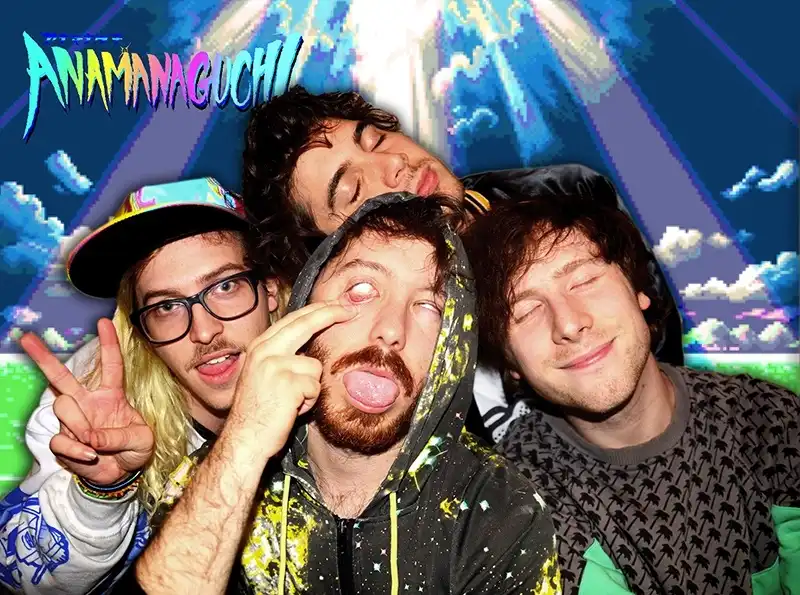Anamanaguchi: A Room Full of Misfits
Music Interviews
Imagine you’re 8 years old. Your older brother has decided he’s too cool for video games, so you have found yourself spending a lot more quality time with Mega Man. You’re full of pixie sticks, amped up on energy, and you just know that you’re gonna get to Dr. Wily’s fortress today. As you hear The Ramones coming through the wall of your brother’s bedroom, you beat Wood Man on your first try, so you guzzle a celebratory can of Coke.
Then you beat Bubble Man, and Crash Man and Air Man, and before you know it, you have conquered Mega Man 2, riding a wave of guitars and sugar and adrenaline and fun. That’s what Anamanaguchi’s music sounds like. The Brooklyn-based instrumental band has risen to Internet fame over the past few years with their retro video game style sound, and garnered even more attention after performing the soundtrack for the Scott Pilgrim vs. the World video game. Last month, the band released their first official full-length album, Endless Fantasy, and has embarked on a tour to support the album. Before their stop in SLC at the Shred Shed on June 1, SLUG spoke with drummer Luke Silas while the band was on the road.
SLUG: If someone had never heard Anamanaguchi’s music, how would you describe it to them?
Silas: The term that we’ve been throwing around—not in any kind of official capacity, but we came up with it and think it’s fun—is EPM, electronic punk music. It’s loud, fast, electronic rock. It’s hard to nail down, exactly. It’s funny because when people talk about the term “post-rock,” I think most people have a very narrow definition of what that is. But realistically, post-rock is taking rock instruments and putting them into a new context that they were not in before. So I dunno, maybe we’re post-rock.
SLUG: Now that you say that, I think that’s a good classification of Anamanguchi’s sound. I’ve been listening to a lot of Fang Island and And So I Watch You From Afar, and you guys really aren’t too far off musically from either of those bands.
Silas: We actually toured with Fang Island last fall. We went down to Austin together to play Fun Fun Fun Fest. And So I Watch You From Afar is super rad, too. I think we connect to Fang Island on a lot of different levels. Of course, there’s the overall vibe of hyper-positive, acceptive joy. We also try to create massive sounds in distinctly different ways. I appreciate those guys a lot.
One of the first shows I played with Anamanaguchi when I joined in 2008—I was the last one to join this iteration of the band—we played with Fang Island on Cinco de Mayo in Brooklyn. I was so excited because I had been listening to their music and was stoked that their guitarist had played in Daughters, and it was just the best.
SLUG: You said that you think Anamanaguchi and Fang Island are similar in that your music conveys a lot of joy. Do you ever find that limiting? Have you ever wanted to expand beyond that and create some heavy, sad shit or something?
Silas: It’s interesting, because not everything we have is supposed to be all happy all the time, because that’s not really that fun. A lot of stuff on the new record treads some pretty new ground, emotionally. Some stuff is more melancholic, some stuff is more aggressive in a way that we have not really done in a way before.
Whatever we’re playing all comes from the same, heartfelt position I think, though. As far as branching out emotionally, that’s a difficult question to answer. It’s funny, because a lot of people will ask if we’ve thought to do something in a different musical style, but if someone asks if we want to make something from a different emotional perspective, it’s a little bit different, but I like that.
SLUG: For people who don’t know, could you briefly explain the band’s technical setup?
Silas: We use a NES that has been modified so we can write unique musical compositions on the system and play it live with guitars and drums and a crazy light setup. More recently, we’ve started using different software that uses more 16-bit sounds so we can do more sample-based and synth stuff.
SLUG: Reading a bit about Endless Fantasy, a big point that has been made is that it took three years to create and features 22 songs. Why did Anamanaguchi decide to release all of this music all at once, rather than spreading it out over a few months or even a few years?
Silas: There are a few reasons that instantly come to mind. I should probably clarify that the actual making of the record didn’t take three years—some of these songs are as old as 2009 or 2010, and we were going back on a lot of different things. We had a few different offers from labels on how to put out this record, and not just that, but we got to the point where we didn’t have the funding to invest time into creating this record.
It took three years for us to get everything together—the actual creation of the album was probably only over this last year. We put it out the way we did for a few reasons, too. There’s this Pitchfork review of the expanded edition of [The Smashing Pumpkins’] Mellon Collie and the Inifinite Sadness that came out last year, and I remember reading it while we were working on this record. There was a line in there that really stuck with me, and I know it sounds entirely pretentious to compare this album to Mellon Collie and the Infinite Sadness, because that’s a huge record, it’s perfect, so I just wanna make it clear I’m not saying that Endless Fantasy is Mellon Collie and the Infinite Sadness.
There’s a part in the article where the reviewer says it’s really easy to write off putting out an album of that size as pompous or arrogant or cheesy, but really, it was the only way they could document all the amazing songwriting and hard work that was being done by Billy Corgan at that time.That’s really what Endless Fantasy is. In the time that we’ve been a band together, there has been so much awesome shit that Peter and Ary—who do most of the songwriting—have made.
Obviously, if we wanted to do something standard, than it would’ve been a 12-song album, and put out some EPs or staggered the release of everything, but at the same time, fuck that. That’s boring. That’s why we have this whole Kickstarter campaign going. There’s no reason it has to be so static. This record is an ongoing document, because we’re currently changing, our setup is currently changing, everything about us is currently changing and there’s no reason things don’t have to keep changing.
In the way that things are sent around on the Internet and the way things are edited and upgraded, we basically have DLC for our album. We wanted it to be a much bigger, fuller experience, because it didn’t seem like giving this work the attention it deserved by signing to a label , putting out 12 songs, touring with them and that’s that.
SLUG: You mentioned the Kickstarter. One thing that I think is interesting about you guys is that you have this huge Internet presence, but you still want to put out your releases on CD and on vinyl. How important is it to release Endless Fantasy on a physical medium?
Silas: It’s very important. It’s a document. For everything I just said about how everything is changing and ever-evolving, at the same time, it is going to be a record, but it’s going to be our record and we want that to stand out.
We all grew up huge music people—I’ve been collecting records since I was 13 or 14. That’s also a big part of how we want to make the album special. We just didn’t want it to be a standard jewel-case CD. We wanted it to look gorgeous in every way possible. We wanted to make this cool looking vinyl, and these awesome flash drives full of songs from the new album. A little bit before the album came out, we and our producer leaked it onto what.cd. It’s gonna go up there no matter what, so we better make sure people have the best possible version of it, and we wanted our producer to get a good ratio on there.
The response to it has been incredible. When you put something out that people really care about, they’re going to support it. Just putting it up on there and having people find it, we’ve seen people commenting and donating to the new album on Kickstarter. It’s an incredibly supportive community, because everyone is on the same page about it. People are gonna support what they think has merit, and we’re trying to stay conscious of that, and it makes us work harder, because we want that merit to be there.
SLUG: I just checked the Kickstarter today, and you’ve raised over four times your goal—that’s pretty awesome.
Silas: Every single day I’m blown away by how much this keeps going. It’s very, very far beyond what we thought would happen. We had meetings before we put it up, asking ourselves what we were gonna do if we didn’t make the goal. It’s exciting to have that weight off our shoulders.
SLUG: I grew up as a music person, but also as a video game person, and both of those fandoms can be fierecely loyal. I think it’s cool to see video game people supporting it.
Silas: What’s really amazing to me is the confluence of people who end up coming to our shows. When we played in New York and Boston and Philly, there was this amazing mix of hardcore punk kids and Internet people and gamer kids and people from all walks finding something they enjoy and coming together for it. It’s nothing short of beautiful. The thing about it, like you said, is that the punk scene and the gamer scene are just very loyal followers.
They’re going to continue loving what the love. They’re both in this Ian Mackaye mindset that they’re just this room full of misfits. That’s what this is. We don’t really fit into any specific genre or style, and we don’t really try to, but we’re making exactly what we want, and it seems to appeal to people from all over the place. So we’re creating our own room full of misfits.
Anamanaguchi will bring their sugar-soaked hyperactive video game rock to the Shred Shed on June 1 with Chrome Sparks and locals Baby Ghosts. Their Kickstarter campaign for Endless Fantasy runs until June 2, and can be found here.



